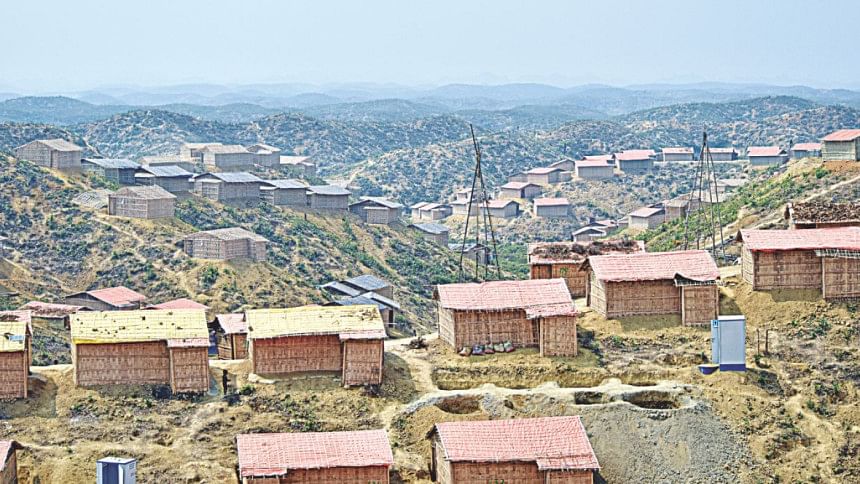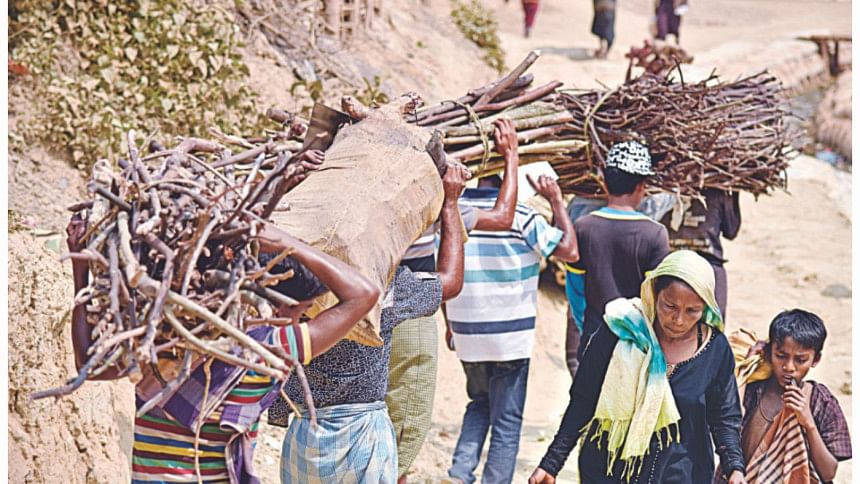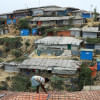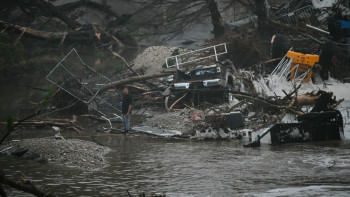TREES, HILLS RAZED by ROHINGYAS

It was around eleven in the morning.
Equipped with spades and sacks, some 10 to 12 children were digging small holes to collect plant roots from a flattened part of a hillock in Ukhia's Balukhali Rohingya camp area.
A few metres away, some other children were also desperately looking for kindling. They were gathering it to cook food.
Although the persecuted Rohingyas, living on hillocks, are being provided with uncooked food as aid by some international agencies, the refugees still need firewood to prepare them.
“I go out every day before sunrise, walk for about four hours and go to the far end of the forest where we still can find some trees and bushes,” Abdul Gani, a Rohingya youth living in an area called QQ Zone, told The Daily Star recently.
“I return with firewood in the noon. We do it every day” he said.
Mohammad Ismail, another Rohingya youth, said, “We are being given uncooked food but how can we make them without fuel?”
“Going that far into the forest and coming back with a heavy load is not easy,” he added.
Rohingyas returning to their tents with firewood on their heads is a common sight in Ukhia. Having no other option, they are now razing trees and forests, even four to five kilometres off their tents, to collect the fuel.

A huge area of the Ukhia reserve forest had already been razed to the ground following the Rohingya influx.
Around 4,000 acres of forestland in and around Kutupalong and Balukhali of Ukhia has been destroyed to build makeshift home and collect firewood until this March, said Mohammad Ali Kabir, divisional forest officer of Cox's Bazar.
This is continuing, said the official, who could not say exactly how much of forest land has so far been destroyed.
He, however, said the signs of destruction were seen even within two kilometres of the Inani Beach, known for its scenic beauty and corals.
Ali cautioned against the risks of landslides following the destruction of the hills.
The report of a recent survey titled “Environmental Impact of Rohingya Influx”, conducted by the UNDP Bangladesh, said 26,000 hectares of forestland within the 10-kilometres radius of the Rohingya camps would be destroyed in a year if the Rohingyas were not provided with alternative fuel for cooking.
Mohammed Abul Kalam, commissioner of the refugee relief and repatriation commission (RRRC) in Cox's Bazar, said the Rohingyas need 2,200 metric tonnes of firewood every day for cooking meals and currently the only choice they have is to cut down trees from nearby forests and hills.
Failing to secure spots at the registered camps, the Myanmar nationals set up around 200,000 makeshift tents mostly in the Ukhia upazila, he said.
“The only solution we see to save the forest is to supply them gas cylinders,” he said, expressing hope that they might start providing the gas to the refugees next month.
Currently, some organisations are supplying firewood to Rohingyas but those are inadequate in comparison to the huge number of the refugees, he said.
Some seven lakh Rohingyas fled persecution in Myanmar and entered Bangladesh following a military crackdown on them in Rakhine since August 25 last year.

 For all latest news, follow The Daily Star's Google News channel.
For all latest news, follow The Daily Star's Google News channel. 








Comments